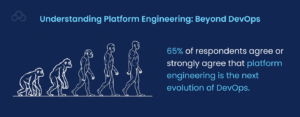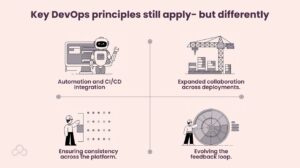Introduction
DevOps has served as the foundational approach for contemporary software development to unite developers with IT operations teams over a ten-year period. The new thinking of collaboration alongside automation and continuous delivery formed under the agile principles. The software lifecycle became faster and more reliable because DevOps introduced speed to development while ensuring software reliability which allowed teams to provide immediate customer-driven solutions.
The most skilled DevOps teams also experience management challenges while working with complicated systems and large, expanding teams. High levels of demanded speed, together with security needs and consistency requirements, exceed the basic capabilities of traditional DevOps models within many enterprise environments. Staff members deal with multiple tools and manage diverse cloud platforms while establishing uniform standards in distributed architecture systems without sacrificing developer productivity.
Platform Engineering stands as an emerging field that represents a substantial progress in the methods people use to develop and run software at large scale. The development of integrated self-service platforms stands as the core approach of platform engineering because it enables developer efficiency through streamlined operational requirements.
The DevOps engineer serves as the leading contributor to this shift. DevOps engineers used to concentrate on pipeline automation and infrastructure maintenance, but have developed into crucial developers’ experience architects in present times. The engineers have shifted their work to building reusable platform tools in addition to guaranteeing environment consistency alongside developer-operable platforms.
The emergence of platform engineering presents DevOps engineers with available tools and methodologies that allow them to advance DevOps principles to create better collaboration and reliability and drive innovation throughout the complete software delivery sequence.
This piece will examine the current DevOps service evolution while discussing its reasons and implications regarding future development.
Understanding Platform Engineering: Beyond DevOps

An exploration of platform engineering requires us to recall the original establishment aims of DevOps. Through DevOps, organizations sought to resolve the barriers between operating and development personnel by implementing systems that joined custody and coordinated reviews while enhancing workflow efficiency. Implementation of automated processes and monitoring systems, and teamwork allowed groups to create deployment cycles that were faster and more dependable.
The widespread adoption of DevOps by organizations led to new obstacles that businesses had to face. The blending of many tools, platforms, and duties between developers led to a decline in their work experience. The infrastructure teams transformed into performance hindrances because they had to manage numerous applications requiring different requirements. These best DevOps methods failed to achieve either consistency or standardization for the organization.
Platform engineering relies on the creation of internal developer platforms (IDPs), which create self-service environments that make infrastructure complexity vanish while giving developers faster code deployment. Platform teams made up of experienced DevOps engineers operate these platforms, which act as self-service environments to support developers in their work.
The Role of the DevOps Engineer in Platform Engineering
DevOps engineers exceed their past duties of crafting pipelines and managing tools. In the world of platform engineering, their role shifts to one of product thinking and user experience.
Every internal developer platform must be treated like a separate product that serves the needs of developers inside the organization. Platform development aims to establish a dependable system that enables developers to obtain resources while testing and service deployment, and application monitoring functions without requiring operational team tickets.
As a member of platform teams, the DevOps engineer builds reusable components and maintains secure infrastructure, and ensures platform scalability through business growth.
The required skill set for this evolving position includes programming expertise combined with basic infrastructure expertise and customer-oriented thinking. The platform engineers recognize developer challenges to create practical solutions that minimize their work efforts.
Key DevOps Principles Still Apply—But Differently

Platform engineering augments DevOps principles rather than establishing new alternatives for them. The main priority stays focused on automation combined with continuous integration and delivery (CI/CD) alongside monitoring and feedback loop operations. However, the implementation changes.
Platform engineering adopts new implementations of DevOps core principles as explained below:
1. Platform engineers design automation elements directly into platform infrastructure, which includes GitOps workflows and self-service provisioning features and ready-to-use CI/CD templates.
2. DevOps worked on eliminating the divides that separated developers from operators. The development of platform engineering brings collaborative needs from multiple departments, including security and QA, and compliance, into the platform design at its initial stage.
3. Insignificant DevOps results from a lack of consistency across operational deployments. The implementation of platform engineering produces consistency as a core capability of IT systems. Standardized infrastructure-as-code templates accompany approved container images, which integrate with unified monitoring solutions that teams must use.
4. Feedback Loops play an essential role in operations because they remain fundamental between DevOps and platform engineering systems. The platform team now collects feedback about developers in addition to software-related feedback. The organization uses developer satisfaction and time-to-deploy metrics alongside others as core performance indicators.
Why Companies Are Moving Toward Platform Engineering
Platform engineering has become the choice of numerous companies of all sizes to strengthen their software development lifecycle.
1. At larger scales, organizations find it difficult to maintain traditional DevOps methods, which work for all teams. The centralized platform helps teams scale DevOps services better by providing standardized tools alongside their independence to operate autonomously.
2. The implementation of platform engineering creates fewer obstacles for developers throughout their work periods. The provisioning process allows developers to gain immediate access to necessary tools and environments while bypassing manual delays and IT infrastructure problems.
3. Operational efficiency improves because platform teams develop reusable centralized components, which cut down efforts and eliminate extra manual tasks. The platform allocation of operational responsibilities makes it possible for operations teams to concentrate on strategic initiatives while they avoid wasting time on single-component deployment debugging.
4. The unified platform establishes security and compliance because it introduces default security measures that protect the system. The standard configuration approach with policy-as-code integration enables organizations to maintain best practices across the organization without unnecessary team burden.
5. Platform engineering serves as the final condition that speeds up innovation rates through its accelerated development pace. Companies can adapt to market changes rapidly and conduct experimental work more aggressively through developer empowerment for quick building, testing, and deployment abilities.
What a Platform Team Looks Like
The standard organizational structure for platform teams combines software developers along with DevOps professionals and site reliability engineers among other team members who may include product managers. Application teams use the platform structure developed by these combined teams.
A platform team at maturity level supports the following core functions:
– The platform development team builds APIs alongside interfaces that protect developers from complex operations.
– Creating documentation and onboarding guides
– A successful platform team provides support for different programming languages as well as framework choices alongside deployment methods.
– The platform delivers functionality for observability in addition to logging services and performance measurement tools
– Identity management responsibilities include controlling access along with policy administration duties
Development teams represent an ongoing source of interaction for the team, which enables them to receive pain points and develop platform design iterations. Platform engineering achieves success through its feedback-driven approach, which stands as the key factor for overcoming traditional DevOps implementation limitations.
Challenges and Considerations
Platform engineering does not eliminate everything. The implementation of platform engineering demands major financial commitment, together with deep collaboration between different department,s while necessitating organizational change. Some common challenges include:
– The potential outcome of platform engineering is developing structures that exist beyond requirements, so they restrict the development team’s flexibility.
– Development teams should view a platform as useful only when they adopt it. The successful adoption of a platform requires teams to focus on making it usable while delivering good performance and documenting the process.
– Every product requires ongoing maintenance since developers must both update and refine the solution as business requirements transform. Leadership must maintain a lengthy dedication throughout the process.
– Searches for DevOps engineers prove difficult because organizations struggle to locate personnel who possess technical abilities, together with product development mindset competencies. Organizations commonly need to provide training and related skill development activities for their personnel.
Despite numerous technical barriers, the advantages of platform engineering belong to organizations while being an inevitable next step for DevOps.
How to Get Started with Platform Engineering
Moving toward platform engineering requires these practical steps for your initiative.
1. Begin your assessment by identifying development difficulties developers face throughout your current DevOps services platform. Where are the bottlenecks? The automation potential exists for different manual operations.
2. A cross-functional team should form a platform team to develop an MVP of the minimum viable platform. Your project should begin with limited target applications before slowly expanding one step at a time.
3. Turn Your Internal System Development Into A Genuine Product Orientation. The process includes defining your intended user group while making sure to collect ongoing feedback and then monitoring how users accept and like the platform.
4. The platform development should prevent single-use scripts along with stand-alone workflows. The platform development should focus on creating reusable standardized templates along with automation tools, which will benefit multiple teams.
FAQs
1. What is platform engineering in DevOps?
Platform engineering came after DevOps development to concentrate on creating internal developer platforms (IDPs). Platform developers gain access to self-service tools on these platforms, which conceal infrastructure complications to help developers better execute their application development tasks. The approach implements DevOps fundamentals through a scalable model that serves users directly.
2. How does platform engineering differ from traditional DevOps services?
Platform engineering moves beyond DevOps services because it adds infrastructure productization functions to the core DevOps principles of collaboration and continuous delivery, and automation. Through the construction of reusable components and self-service systems, platform engineers deliver better developer experiences and decreased operational costs, together with homogeneous team operations.
3. What is the role of a DevOps engineer in platform engineering?
The DevOps engineer in platform engineering becomes responsible for strategic system developments. The engineer engages in platform designing and maintenance work by concentrating on automation, scalability, security, and user experience development. Through a properly designed self-service tool, they aim to strengthen development teams.
4. Why are companies adopting platform engineering?
Organizational entities adopt platform engineering to extend the reach of DevOps and enhance developer efficiency and deploy operations uniformity. Organizations experience faster time-to-market along with better security standards through standardized tools that minimize human intervention.
The Future of DevOps is Platform-Driven
DevOps isn’t dead—it’s evolving. Platform engineering represents the growth of the DevOps movement through its focus on developer-centered solutions and operational effectiveness, and system scalability. Business organizations that develop sophisticated systems now require internally developed platforms to succeed in their digital operations. Such platforms create standardization throughout development teams while decreasing technical difficulty for developers to work with and supporting present-day application delivery systems.
The implementation of platform engineering supports DevOps activities without substituting it by adding advanced capabilities. Companies maintain their rapid operation speed through reusable DevOps-based systems, which deliver scalability without any compromise to security or system stability. Through infrastructure enhancements, organizations gain the ability to develop products more confidently because they can achieve rapid iterative development while promoting cross-team teamwork.
The present-day DevOps engineer faces development challenges while embracing opportunities through this advancement. Organizations must develop employees with expanded capabilities through infrastructure automation alongside user-focused design elements and developer workflow expertise. The practice of platform engineering places experts in front of innovation because they create toolsets along with environments for the forthcoming generation of software development.
Organizations that efficiently construct robust systems will lead the industry. The solution to achieve this transformation is platform engineering.
Do you like to read more educational content? Read our blogs at Cloudastra Technologies or contact us for business enquiry at Cloudastra Contact Us.